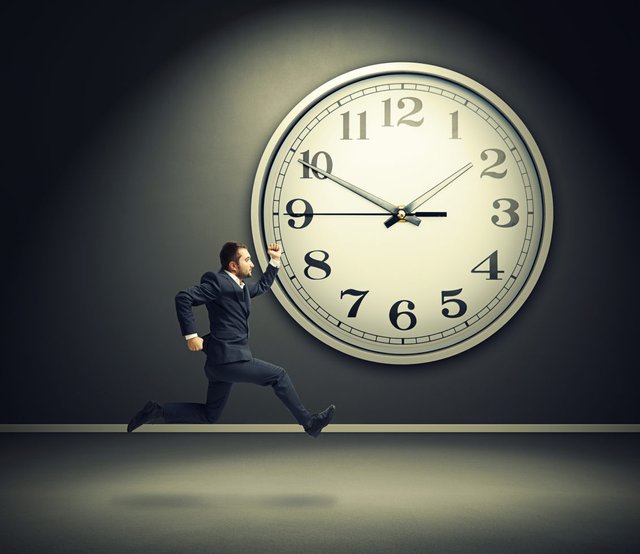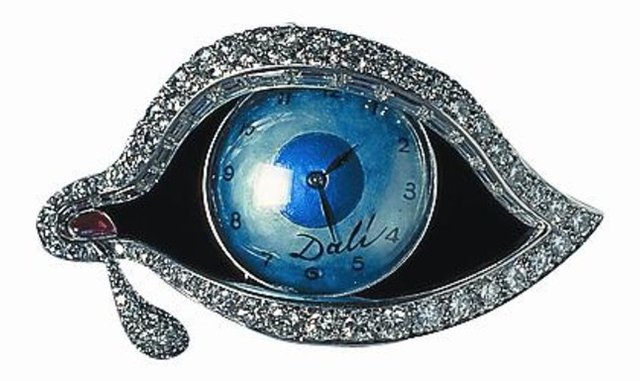
When we are small, each birthday seems to be a century away. However, as we grow and age, time seems to accelerate and each year "runs" faster than the previous one, that is, our perception of time changes.
Experiments have shown that, in effect, our way of perceiving time is altered with age but they have not served to find the explanation. This subjective perception is influenced by many factors, both circumstantial and physiological; Then we comment on them.
How do we perceive time?
In order to perceive the light or the color we have eyes and for the sounds of ears, nevertheless, to perceive the time, we do not have any specialized organ. Even so, we have a sense of the passage of time that allows us to distinguish what happened years ago or days of what just happened. We need even more, as we can distinguish minutes from seconds and these from milliseconds.
To guide us in time, our brain has biological clocks, such as the suprachiasmatic nucleus of the hypothalamus or pineal gland, which control the sleep and wake cycles and the production of hormones and neurotransmitters. There are also external markers or circumstances that help us do this, such as artificial clocks, daylight changes or even watching children grow.

The perception of time is also related to the senses. For example, we evaluate more accurately what a sound lasts than what lasts a visual image. Not surprisingly, by its nature, the auditory system is the human sensory system with more specialization and ability to perceive time. However, we know that without the view we could not see, for example, whether it is day or night.
Our ability to form memories, that is, memory, is also essential. One of the things lost by amnesiac patients is precisely the ability to perceive time, both short and long periods of time.
As we have seen, in the human brain there is no single biological clock that marks time objectively, but involves different organs and structures of the brain. It may be precisely because of this that it is so difficult to explain how we measure time subjectively.
Circumstances, emotions and perception of time
Time flies when we are cheerful, motivated or busy. On the contrary, when we are sick or sad, it hurts something, we are tired or uncomfortable, we get bored, we wait for someone with impatience or we are in danger, time seems to have stopped.

It also becomes eternal when we pay attention to it, that is, when we are waiting for it.
They also influence levels of dopamine, a neurotransmitter (allowing communication between neurons) involved in the processing of emotions. When we experience an emotion releasing dopamine, our brain processes the information more quickly and we have the impression that time passes more slowly. This may help explain why unpleasant and intense situations that have occurred in 10 seconds seem to have lasted 10 minutes.
In contrast, with age, the levels of dopamine (and all neurotransmitters) decrease, the nervous system slows down and the subjective perception of time accelerates.
The energy expenditure of the brain
According to David Eagleman, a neuroscientist who studies phenomena related to the perception of time at Baylor College of Medicine, psychological time runs in an internal clock guided by our experiences. In other words, duration and rhythm are made by memory.
The scientist explains that our perception of time varies depending on the energy spent by the brain when we process information:
"When the experience is new, our brain spends more energy and produces the feeling of more time".

According to their theory, our "first few times" suppose for our brain a greater energetic expenditure because we pay them more attention and we record more details than when the experience is repeated. This energy is invested in making us a mental representation of what is happening and in keeping it in our memory. This mental "effort" gives us the feeling that the time elapsed is greater. When the experience is repeated we do not have to process so much new data in our brain because we already know them and, unconsciously, we pay less attention.
Most new experiences accumulate during childhood, adolescence and early youth. During our years of youth we have some totally new experience every hour of the day, subjective or objective. If, as children, time passes more slowly, it is partly because we are permanently in the present, experiencing new things and paying close attention to our surroundings.
But every year that passes that experience becomes an automatic routine that we are only aware of. The days and the weeks are diluted in our memory to become periods of time without content.
On the other hand, the memory is marked by certain events that are significant and help us measure the time lived: the first day of school, a wedding, the first drunkenness, the day a child was born are recorded in our memory more In detail than the memory of what we ate last Monday. Because all similar memories are merged into one and occupy, in our memory, a very short span of time.
So since most of these important events, especially "first times", often happen at relatively early ages, it is not surprising that our memory has recorded childhood as a slow and long time.
Changing routines and looking for new experiences will allow us to create new memories, fresh experiences and keep our brains and minds young.
Source: Nosabesnada

I like the percentage way of looking at it. The Washington Post explain it well but essentially it is this:
Downvoting a post can decrease pending rewards and make it less visible. Common reasons:
Submit
Nice input! Never thought it that way, but it makes sense..
Downvoting a post can decrease pending rewards and make it less visible. Common reasons:
Submit
I like your approach too. It goes to explain the 'time flies when you are having fun' concept
Downvoting a post can decrease pending rewards and make it less visible. Common reasons:
Submit
thx for sharing
Downvoting a post can decrease pending rewards and make it less visible. Common reasons:
Submit
Thanks mike!
Downvoting a post can decrease pending rewards and make it less visible. Common reasons:
Submit
Really detailed and well-crafted information
Downvoting a post can decrease pending rewards and make it less visible. Common reasons:
Submit
Thanks @bluemist, glad you enjoyed it.
Downvoting a post can decrease pending rewards and make it less visible. Common reasons:
Submit
You are more than welcome
Downvoting a post can decrease pending rewards and make it less visible. Common reasons:
Submit